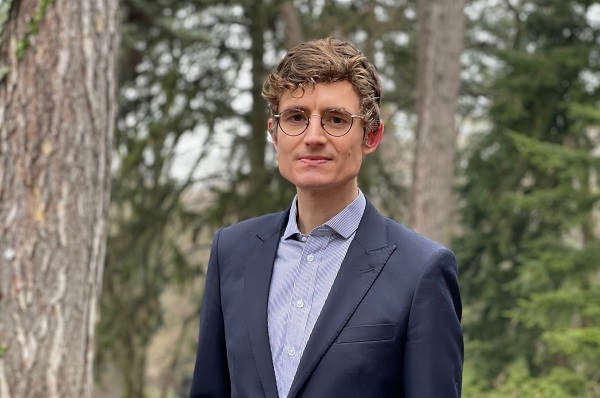Starting in March, Phillipp Homar will be the JKU’s new professor for Intellectual Property.

What is your area of research?
Prof. Philipp Homar: As a law graduate with a second degree in media studies, I focus mainly on intellectual property rights, copyright law, patent law, trademark law and design law in particular. Key areas also include legal issues related to the shift in business models and use of practices into virtual environments as well as emerging innovations in the field of autonomous systems ("artificial intelligence").
My most recent research focuses on the legal challenges digital platforms pose, particularly to the intellectual property regime. A cornerstone, of course, was and is Article 17 of the Copyright in the Digital Single Market Directive which outlines liability principles for user upload platforms, such as YouTube.
Why did you choose to come to the JKU?
Prof. Philipp Homar: At the interface of technology, business and law, the JKU is positioned like no other university in Austria. The university is also embedded in an area of industry and innovation in which intellectual property is a key driver. In addition, the infrastructure at the LIT Law Lab provides unparallel access to existing research initiatives that focus on digital transformation.
What do you find particularly fascinating about this area?
Prof. Philipp Homar: More than almost any other area of law, digitization affects intellectual property. There are constant challenges to keep pace with social, economic and technical changes. Researching intellectual property means questioning the structures which we - as a society - want to tap into and use, such as knowledge and innovations.
Why is this research even necessary, meaning how will it improve our lives?
Prof. Philipp Homar: We are all confronted with intellectual property in different roles on a daily basis, be it by using someone else’s creations in a professional or personal context, be it in the context of education or learning, or be it that we ourselves produce creative, scientific or cultural content. The conditions under which intellectual property law protects intellectual creations and permits their use determine the most diverse dimensions of our everyday lives. We see this in regard to the development of the COVID-19 vaccine: On one hand, patents are important to provide economic incentives to develop a vaccine. On the other hand, they restrict access. In this regard, it is essential to find a balance between exclusive exploitation opportunities and access opportunities.
Why should students take your classes?
Prof. Philipp Homar: As part of social and legal policy discourse, intellectual property is often discussed in a very interest-driven way. When it comes to this legal area, the background and protective purposes often remain hidden. By using examples from the students’ personal everyday lives, an important part of my classes would be to convey the protective purposes of intellectual property and point out the plurality of interests. The goal is to not only contribute to objectifying the discourse on intellectual property, but also prepare students for professional activities as, after all, many JKU graduates will go on to work in various areas of business where intellectual property is a crucial cornerstone.
For me personally, university education is not just a one-dimensional transfer of knowledge, but rather an interactive process to acquire valuable input for research on intellectual property.
What are you currently working on?
Prof. Philipp Homar: At the moment, I am part of an interdisciplinary research team consisting of academics and scientists from the Danube University Krems and the Vienna University of Economics and Business Administration. We are close to completing a top citizen science research project and have developed a digital discussion platform for citizens to discuss and evaluate their proposals for copyright reform and constructively contribute to the copyright reform process.
I am also currently close to finishing two major publications. In addition to a comprehensive contribution to a legal commentary on Austrian copyright law, my monograph "System und Prinzipien der gesetzlichen Vergütungsansprüche des Urheberrechts" will be published soon.
What are your hobbies?
Prof. Philipp Homar: Unfortunately, hobbies have come up far too short lately. However, I balance my life with travel, running and music.
What else do you want to do or achieve in your life?
Prof. Philipp Homar: There are still a few countries that I would definitely like to travel to. On one hand, I hope that travel will soon be possible, but on the other hand, it is also nice to continue having unknown destinations ahead. I have a strong, professional international network and would enjoy expanding this network through, for example, reciprocal guest research stays abroad and additional research collaborations.








